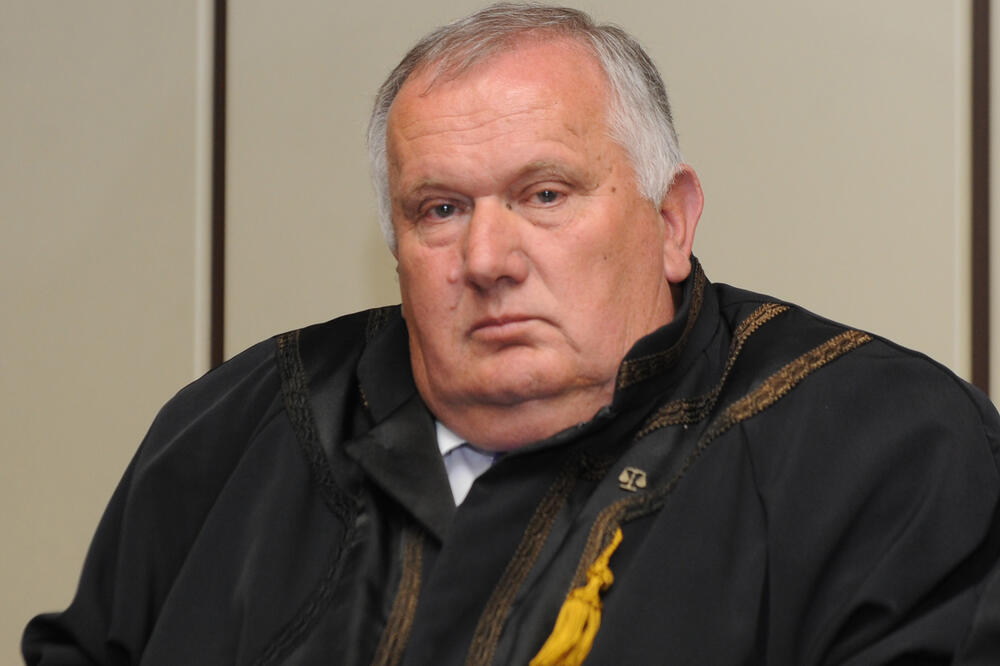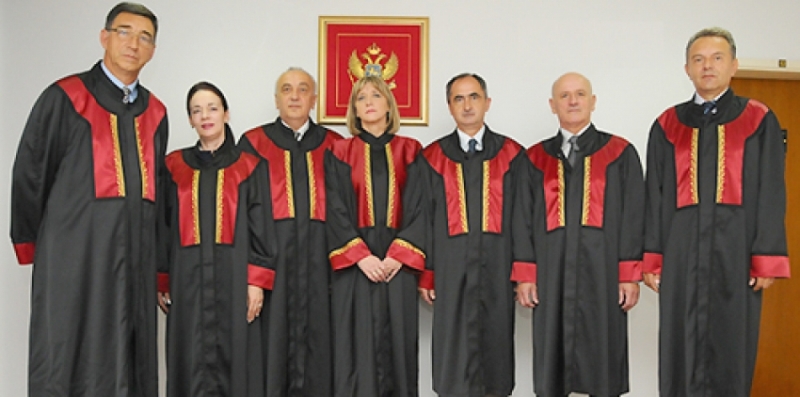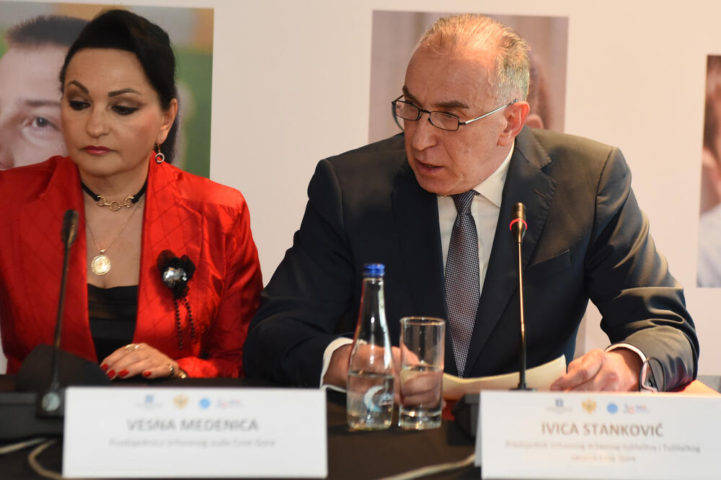
HRA WELCOMES ANNULMENT OF JUDICIAL COUNCIL’S DECISION ON ELECTION OF VUCKOVIC AS THE PRESIDENT OF THE BASIC COURT IN KOTOR FOR THE EIGHTH TIME
03/11/2020
SIX NGOs CALL FOR ELECTION OF PRESIDENT OF CONSTITUTIONAL COURT AS SOON AS POSSIBLE
09/11/2020“THE EMPEROR IS NAKED”: THE JUDICIAL AND PROSECUTORIAL COUNCILS ARE AFRAID TO STATE THAT MEDENICA’S AND STANKOVIC’S DUTIES HAVE CEASED

Foto: Savo Prelević
As many as 30 judges in Montenegro met the conditions for retirement, and therefore their judicial duties needed to be terminated on the basis of Article 121 of the Constitution of Montenegro and Article 105 of the Law on the Judicial Council and Judges. Among them are 23 judges who have been duly reported to the Judicial Council by the presidents of their courts, but also the president of the Supreme Court and six other judges of that court, about whose fulfillment of conditions for retirement the Judicial Council had not been officially notified. The Judicial Council has been obliged by law to declare the termination of judicial offices of those judges but refused to do so.
Furthermore, the prosecutorial duty of the acting Supreme State Prosecutor, Ivica Stanković, had to be terminated too, as well as duties of at least 7 other prosecutors, although the heads of state prosecutor’s offices did not inform the Prosecutorial Council about that. Mr. Stanković is presiding over the Prosecutorial Council.
The Judicial Council (JC) has already explicitly refused to declare the termination of office of all judges who fulfilled retirement conditions until the decision of the Constitutional Court on their request for constitutional review of Article 17 of the recently enacted Law on Pension and Disability Insurance, which prescribed new conditions for old-age retirement. HRA considers such a decision of the JCas arbitrary and abuse of office (see: “The Judicial Council is not authorized to extend the duration of judicial duty”; “The Judicial Council is violating the imperative provision of the Constitution on the termination of the judicial duty”).
The Constitutional Court has not commented on the request of the JC to date. That Court does not have a deadline any more within which it is obliged to act, as it had last year abolished the 18-month deadline which had been prescribed by the Law on the Constitutional Court for it to decide on cases. HRA previously explained that, based on the Constitution and applicable laws of Montenegro, all duties of judges and prosecutors fulfilling retirement conditions had to cease, as required by legal order, while the Constitutional Court could, possibly, subsequently return them to duty, if and when it finds that the law prescribing the conditions for old-age pension is unconstitutional.
None of the heads of the state prosecutor’s offices in which those seven state prosecutors are employed have informed the Prosecutorial Council about the fact that their duties had to cease, although those heads were obliged to do so under Article 105 of the Law on State Prosecutor’s Office. They probably hesitate to act in accordance with the law in a situation in which the acting Supreme State Prosecutor and the chairman of the Prosecutorial Council, Ivica Stanković, himself remains silent about the fact that his own duty was to cease.
During the Parliamentary hearing prior to his appointment to the position of the Supreme State Prosecutor, Stanković stated that he had been born in May 1954, meaning that he had turned 66 this year, so his prosecutorial duty had to cease under the Article 17, paragraph 1 of the Law on Pension and Disability Insurance prescribing that age as the age of retirement.
The judicial duty also had to cease for the president of the Supreme Court, Vesna Medenica, who was elected by the Judicial Council in July 2019 for the third time on the same function contrary to the imperative provision of the Constitution. Judging by her published biography and based on Article 17, paragraph 2 of the Law on Pension and Disability Insurance, her judicial duty had to be terminated due to her 40 years of service. Her biography states that she passed the Bar Exam in April 1982, and by then she needed to have at least two years of working experience in order to be eligible for that exam.
Vesna Medenica has not commented over the circumstances that her duty had to be ceased, just as Ivica Stanković. HRA believes that this situation is destroying the citizens’ trust in the judiciary and the state prosecutor’s offices. The usurpation of state functions represents anarchy and not the rule of law. If there is understanding for them, then the illegal actions of “ordinary” citizens should also be tolerated, those who Stanković still indicts and who Medenica is still judging.
On October 16, Human Rights Action addressed the Judicial and Prosecutorial Councils with requests for free access to information, asking for copies of all letters submitted to them in relation to the fulfillment of retirement conditions by judges and prosecutors from August 12 (the date of entry into force of the Law on Pension and Disability Insurance) up to date, by the presidents of the courts and the General Session of the Supreme Court, i.e. the heads of prosecutor’s offices and the Session of the Supreme State Prosecutor’s Office. Pursuant to Article 105, paragraph 3 of the Law on the Judicial Council and Judges, the Judicial Council was obliged to issue individual acts on cessation of the judicial duty to all judges whose duty ceased on the basis of the valid Law on Pension and Disability Insurance, within 30 days upon receipt of notice about it by the presidents of the court. Given the dates of receipt of these letters, the deadline for deciding, upon which the Judicial Council was obliged under the Constitution and the law, has passed.
The Judicial Council issued to HRA, within the legal deadline, letters from the President of the High Court in Podgorica, the Administrative Court, the Misdemeanor Court in Bijelo Polje, the Basic Court in Berane, the High Court in Bijelo Polje, the Appellate Court, the High Misdemeanor Court, the Basic Court in Ulcinj and the Commercial Court, which provide data for as many as 23 judges who have met the requirements for old-age pension in accordance with the new Law on Pension and Disability Insurance.
The received letters show that the conditions for old-age pension met the judges of the High Court in Podgorica: Dragica Vukovic, Miroslav Basovic, Vjera Sljivancanin, Verica Sekulic and Miljana Pavlicevic, judges of the Administrative Court Gordana Pot and Biserka Bukvic, judges of the Misdemeanor Court in Bijelo Polje Branko Pantović and Milutin Božović, judge of the Basic Court in Berane Međedović Aiša, judges of the High Court in Bijelo Polje Jadranka Ćulafić, Nedjeljko Mrdak and Šefkija Đešević, judges of the Appellate Court Radmila Mijušković, Ratko Ćupić, Milić Medjedović and Lidija Ivanović, judges of High Misdemeanor Court Dragica Kovačević and Dragica Stojanović, judge of the Basic Court in Ulcinj Buzuk Lirija and judges of the Commercial Court Nataša Sekulić and Milica Popović. Among the names of judges who have met the conditions for old-age pension is also Lidija Ivanovic, a former judge of the Appellate Court, who was recently elected a judge of the Supreme Court of Montenegro by a decision of the Judicial Council of October 15, 2020.
HRA reminds that the Judicial Council, at its session held on October 7, decided by a majority vote to indefinitely postpone acting upon the letters of court presidents until the Constitutional Court makes a decision over its initiative, whereby it exceeded its authority and indefinitely extended the duration of judicial duties to all the above-mentioned judges without authority.
Additionally, despite the fact that the Supreme Court has a significant number of judges who have met the conditions for old-age retirement, together with the President of the Supreme Court, the Judicial Council has not received a single letter containing such notification from either the president or the General Session of the Supreme Court. It is the same General Session, consisting of all judges of the Supreme Court, which in July last year unanimously proposed Vesna Medenica for a third term, ignoring the imperative provision of the Constitution of Montenegro which explicitly prohibited the third term. Judging by their biographies, there are judges in the Supreme Court who have met the conditions for retirement, for example, Branimir Femić, Stanka Vučinić, Dušanka Radović, Natalija Filipović, Dragica Milačić, Rada Kovačević and Vesna Medenica, President of the Court.
On the other hand, the Prosecutorial Council informed HRA that it does not have the relevant letters, meaning that neither the heads of prosecutor’s offices nor the Session of the Supreme State Prosecutor’s Office did what the Law on State Prosecutor’s Offices obliges them to do. This especially having in mind the fact that there was no announcement from the Prosecutorial Council regarding the assessment of the provisions of the new Law on Pension and Disability Insurance. HRA notes that, according to the available biographies from the website of the Prosecutor’s Office, it can be concluded that the conditions for retirement and cessation of the prosecutor’s duty were met by the acting Supreme State Prosecutor Ivica Stankovic, and state prosecutors Radmila Ćuković, Miljana Radović, Veselin Vučković and Petar Kapuci, Special State Prosecutor Stojanka Radović, state prosecutors of the State prosecutor’s office in Pljevlja, Milivoje Tomčić and Božidarka Gačević.






 English
English